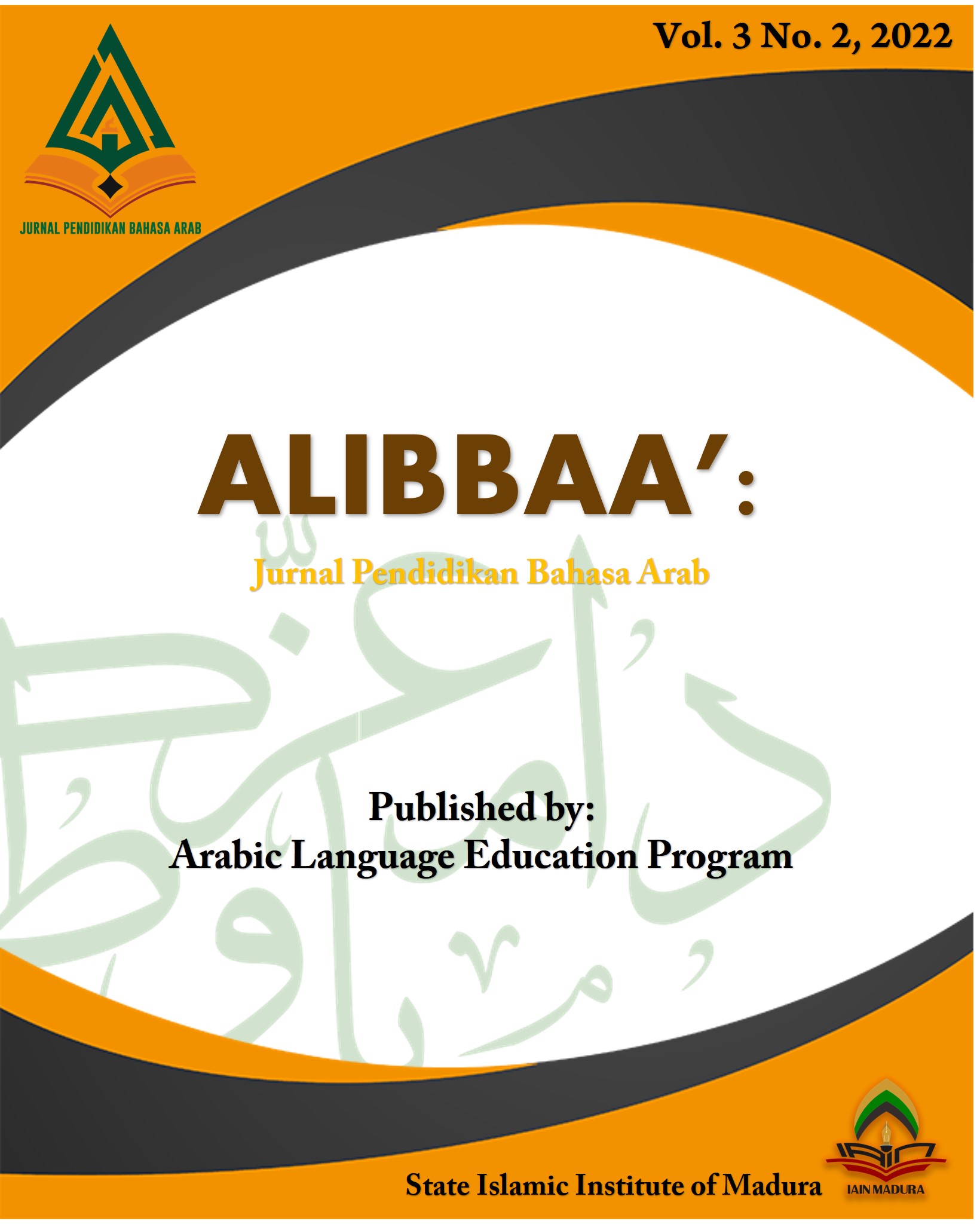Al-'Alâqah Bayna Hifdzhi al-Qurân wa Mahârati al-Qirâah al-Jahriyyah li Thullâbi Ma'had al-Mu'allimîn li Jam'iyyati Muhammadiyyah Bukit Tinggi
 Abstract views: 499
,
Abstract views: 499
,
 pdf downloads: 292
pdf downloads: 292
Abstract
The purpose of this study was to determine the relationship between memorizing the Qur'an and the ability to read aloud Arabic at the Mu'alimin Islamic Boarding School Muhammadiyah Sawah Dangka Bukittinggi. The research sample amounted to 66 students obtained through a systematic sampling technique. The data collection technique used in this paper was a test consisting of a memorizing of the Qur'an and a test of reading aloud Arabic. The data analysis technique used is the Pearson product-moment correlation analysis technique. The results showed that ro was greater than rt (0.424 > 0.242) at a significance level of 5%, therefore the null hypothesis (H0) was rejected and the alternative hypothesis (Ha) was accepted. The conclusion is that there is a significant relationship between the memorization of the Qur'an and the ability to read Arabic aloud and the level of the relationship is in the medium category.
Downloads
References
Aflisia, N. (2016). Urgensi Bahasa Arab bagi Hafizh Al-Qur’an. FOKUS Jurnal Kajian Keislaman Dan Kemasyarakatan, 1(1), 47–66. Retrieved from http://journal.iaincurup.ac.id/index.php/JF/article/view/64
Al-Otaibi, W. H. (2019). Atsar Hifzh al-Quran al-Karim fi Tanmiyah Maharat al-Tafkir al-Istidlali wa al-Tahdhil al-Dirasy fi Maddah al-’Ulum wa al-Ittijah Nahw Ta’allumiha Laday Thalibat al-Marhalah al-Ibtidaiyyah fi Madinah al_riyadh. Dirasat: Al-’Ulum Al-Tarbawiyyah, 46(1), 499–514.
Aziz, A., Padang, R., & Lubis, P. (2021). Hubungan Antara Kemampuan Hafalan Al-Qur’an dengan Prestasi Belajar Bahasa Arab Santri Tadris di Pondok Pesantren Tahfidz Sulaimaniyah Syarief Medan. Jurnal Pendidikan Agama Islam Dan Riset (J-PARIS), 2(1), 18–27.
Farhan, M. (2021). Hubungan Kemampuan Bahasa Arab dengan Prestasi Menghafal Al-Qur’an Siswa Kelas XI MA Sirojul Athfal 2. Tatsqifiy: Jurnal Pendidikan Bahasa Arab, 2(1), 37–44. https://doi.org/10.30997/tjpba.v2i1.3624
Fauziah, R., Ritonga, M., & Alrasi, F. (2020). Korelasi Tsiqah Tahfidz Al-Qur’an dengan Maharah Al-Lughah Al-‘Arabiyyah Mustawa Tsalits Ma’Had Az-Zubair Bin Al-Awwam. El-Tsaqafah : Jurnal Jurusan PBA, 19(1), 25–36. https://doi.org/10.20414/tsaqafah.v19i1.2342
Hilmi, A., & Zamzami, M. K. (2018). Analisis Dampak Pembelajaran Bahasa Arab bagi Para Penghafal Al-Qur’an. Seminar Nasional Bahasa Arab Mahasiswa II, 443–457. Retrieved from http://prosiding.arab-um.com/index.php/semnasbama/article/view/216
Nidia, E., Zubaidillah, M. H., & Nuruddaroini, M. A. S. (2022). Dampak Pembelajaran Bahasa Arab terhadap Penghafal Al-Qur’an. Jurnal Basicedu, 6(4), 6012–6022.
Nursiah & Amin, N. F. (2017). Pengaruh Penguasaan Bahasa Arab Terhadap Kemampuan Menghafal Al-Qur’an Mahasiswi Semester II Ma’Had Al-Birr Makassar. Al-Maraji’: Jurnal Pendidikan Bahasa Arab, 1(1), 60–75.
Robbani, A. S., & Haqqy, A. M. (2020). Al-‘Alaqah Baina Nasyathi Hifzhil Qur’an Wa Maharatil Qira’ah Al-‘Arabiyyah. Maharaat: Jurnal Pendidikan Bahasa Arab, 3(1), 1–22. https://doi.org/10.18196/mht.v3i1.10323
Sugiyono. (2019). Metode Penelitian Kuantitatif, Kualitatif, dan R&D. Bandung: Alphabeta.
Syah, M. (2011). Psikologi Pendidikan dengan Pendekatan Baru. Bandung: PT. Remaja Rosdakarya.
Yuniarti. (2020). Hubungan Menghafal Al Quran dengan Kemampuan Bahasa Arab di Pesantren Dempo Darul Muttaqien. Al-Fathin: Jurnal Bahasa Dan Sastra Arab, 3(2), 220–228. Retrieved from https://e-journal.metrouniv.ac.id/index.php/al-fathin/article/view/3098
Zubaidillah, M. H. (2018). Hubungan Kemampuan Bahasa Arab dengan Prestasi Hafalan Al Quran. Al Mi’yar: Jurnal Ilmiah Pembelajaran Bahasa Arab Dan Kebahasaaraban, 1(2), 19–38. https://doi.org/10.35931/am.v1i2.31
Authors who publish with this journal agree to the following terms:
a. Authors retain copyright and grant the journal right of first publication with the work simultaneously licensed under a Creative Commons Attribution License that allows others to share the work with an acknowledgement of the work's authorship and initial publication in this journal.
b. Authors are able to enter into separate, additional contractual arrangements for the non-exclusive distribution of the journal's published version of the work (e.g., post it to an institutional repository or publish it in a book), with an acknowledgement of its initial publication in this journal.
c. Authors are permitted and encouraged to post their work online (e.g., in institutional repositories or on their website) prior to and during the submission process, as it can lead to productive exchanges, as well as earlier and greater citation of published work (See The Effect of Open Access).
Alibbaa': Jurnal Pendidikan Bahasa Arab have CC-BY-SA or an equivalent license as the optimal license for the publication, distribution, use, and reuse of scholarly work.
In developing strategy and setting priorities, Alibbaa': Jurnal Pendidikan Bahasa Arab recognize that free access is better than priced access, libre access is better than free access, and libre under CC-BY-SA or the equivalent is better than libre under more restrictive open licenses. We should achieve what we can when we can. We should not delay achieving free in order to achieve libre, and we should not stop with free when we can achieve libre.

Alibbaa': Jurnal Pendidikan Bahasa Arab is licensed under a Creative Commons Attribution 4.0 International License
You are free to:
- Share — copy and redistribute the material in any medium or format
- Adapt — remix, transform, and build upon the material for any purpose, even commercially.
- The licensor cannot revoke these freedoms as long as you follow the license terms.











